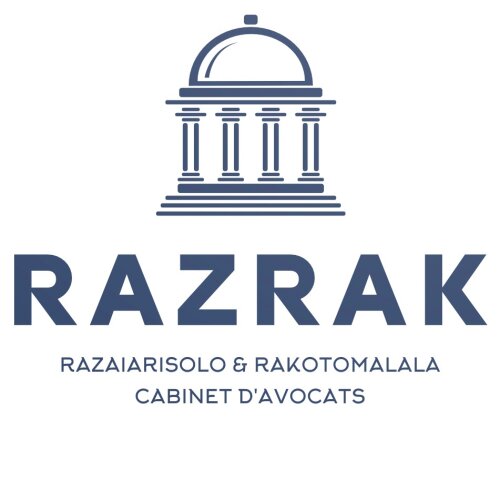Best General Litigation Lawyers in Madagascar
Share your needs with us, get contacted by law firms.
Free. Takes 2 min.
Or refine your search by selecting a city:
List of the best lawyers in Madagascar
About Litigation Law in Madagascar
Litigation in Madagascar refers to the process of taking legal action in a court to resolve disputes among individuals, businesses, or other entities. The legal system in Madagascar is based on a mixture of civil law derived from French influences and local customary laws. The judiciary is independent and comprises different levels of courts that handle various types of cases, including commercial, civil, and administrative disputes. Understanding the nuances of litigation processes in Madagascar is crucial for anyone seeking to resolve legal issues within the country.
Why You May Need a Lawyer
There are several common situations where individuals or businesses in Madagascar may require legal assistance in litigation:
- Contract Disputes: When involved in disagreements over the terms or enforcement of contracts.
- Property Issues: Legal disputes concerning ownership, inheritance, or disagreements over land use.
- Labor Disputes: Issues involving employee rights, wrongful termination, or workplace conflicts.
- Commercial Litigation: Cases involving business transactions, partnerships, or corporate governance.
- Family Law Matters: Divorce, child custody, and other family-related legal issues.
- Intellectual Property Disputes: Conflicts over patents, trademarks, or copyrights.
Local Laws Overview
Several key aspects of local laws are relevant to litigation in Madagascar:
- Civil Code: The foundational legal code that governs most private law matters such as contracts, torts, and property rights.
- Commercial Code: Regulates business practices, commercial transactions, and corporate law.
- Penal Code: Governs criminal law and procedures that might intersect with litigation in civil contexts.
- Customary Laws: While not codified, customary laws often influence legal decisions especially in family and property cases.
- Judiciary Structure: The judicial system is hierarchical, with lower courts (tribunaux de première instance) handling most cases initially, and higher courts (cour d'appel) as well as the supreme court (Cour de Cassation) managing appeals.
Frequently Asked Questions
What types of cases are handled in Madagascar's courts?
Courts in Madagascar handle a variety of cases including civil, criminal, commercial, and administrative disputes.
Is it necessary to hire a lawyer for all types of litigation?
While individuals can represent themselves in certain small claims and minor disputes, hiring a lawyer is recommended for more complex cases to ensure proper legal representation and advice.
How long does the litigation process typically take in Madagascar?
The duration varies depending on the complexity of the case, but it can range from a few months to several years in more contentious instances.
Can foreign nationals litigate in Madagascar courts?
Yes, foreign nationals and businesses have the right to litigate in Madagascar provided they comply with local procedural requirements.
Are court decisions in Madagascar publicly accessible?
Some court decisions may be publicly available, however, access can be limited and often requires direct inquiry with court officials.
What are the costs associated with litigation in Madagascar?
Costs can include court fees, lawyer fees, and expenses related to gathering evidence and expert testimonies. It's important to discuss costs with legal counsel upfront.
Can mediation be considered as an alternative to litigation?
Yes, mediation and arbitration are encouraged as they can be more cost-effective and quicker alternatives to litigation in certain disputes.
How are court hearings conducted in Madagascar?
Court hearings involve presenting evidence, witness testimonies, and legal arguments before a judge or panel of judges, who then render a decision.
What is the role of the prosecutor in civil litigation?
A prosecutor is typically not involved in civil litigation unless the case concerns a public interest or intersects with criminal matters.
Can judgments from foreign courts be enforced in Madagascar?
Foreign judgments may be recognized and enforced in Madagascar, subject to a rigorous review process and the principle of reciprocity.
Additional Resources
For those seeking further information or legal assistance in litigation matters, the following resources may be beneficial:
- Ministry of Justice of Madagascar: The governmental body responsible for overseeing the legal and judicial system.
- Bar Association of Madagascar: A professional organization for lawyers which can provide referrals and legal assistance.
- Chamber of Commerce and Industry of Madagascar: Offers resources and support for commercial litigation matters.
- Legal Aid Clinics: Provide pro bono (free) legal services or consultancy for individuals with limited financial means.
Next Steps
If you need legal assistance in litigation:
- Identify the type of legal issue you are facing to determine the appropriate legal expertise required.
- Contact a qualified lawyer or legal firm specializing in your area of need. Ensure they have experience with Madagascar's legal system.
- Schedule a consultation to discuss your case details, potential outcomes, and strategies.
- Prepare all necessary documents and evidence that support your case for review by your legal counsel.
- Ensure clear communication with your lawyer regarding fees, processes, and expectations. Confirm any agreements or understandings in writing.
Lawzana helps you find the best lawyers and law firms in Madagascar through a curated and pre-screened list of qualified legal professionals. Our platform offers rankings and detailed profiles of attorneys and law firms, allowing you to compare based on practice areas, including General Litigation, experience, and client feedback.
Each profile includes a description of the firm's areas of practice, client reviews, team members and partners, year of establishment, spoken languages, office locations, contact information, social media presence, and any published articles or resources. Most firms on our platform speak English and are experienced in both local and international legal matters.
Get a quote from top-rated law firms in Madagascar — quickly, securely, and without unnecessary hassle.
Disclaimer:
The information provided on this page is for general informational purposes only and does not constitute legal advice. While we strive to ensure the accuracy and relevance of the content, legal information may change over time, and interpretations of the law can vary. You should always consult with a qualified legal professional for advice specific to your situation.
We disclaim all liability for actions taken or not taken based on the content of this page. If you believe any information is incorrect or outdated, please contact us, and we will review and update it where appropriate.
Browse general litigation law firms by city in Madagascar
Refine your search by selecting a city.










